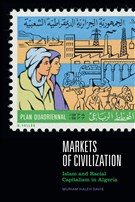When Étienne Balibar wrote that “Algeria and France, taken together, do not make two, but something like one and a half,” he was probably offering a political provocation as well as a historiographical injunction.[1] Yet the statement poses the question of how to think about Algeria’s independence as an Algerianist rather than as a historian of France. It poses the question as to why the amnesia that has long marked the French academy vis-à-vis Algeria has been reproduced in the current historiography, which rarely attempts to delve into the nitty-gritty of state building—not to mention the amnesia of the American academy which still wonders what to do with the Maghreb. It raises the question of why, at a time when so much time has been consecrated to understanding and theorizing anti-colonial nationalism, the subsequent construction of that nation-state still receives so little attention. Indeed, there is a historical irony behind Balibar’s statement. At the moment that colonialism was no longer a reality, post-colonialism as a theoretical movement came to “commemorate a lost object” to borrow a phrase from Gayatri Spivak.
All of the papers here approach the Algerian Revolution as something that was itself productive – of repertoires of contestation, of ideas about a “social contract,” of something that that could later be “confiscated” – rather than as a historical bookmark. They also indirectly speak to a historiographical concern: by seeing 1962 as either the beginning or end, is the periodization of professional historians not in an unsettling convergence with the official narrative of the FLN? These papers also unpack the FLN as a constructed artifact that has seen many avatars since 1962 – from Ben Bella’s first breathy experiences with a “specifically Muslim” form of socialism, to the hide tide of state centralization and Third-Worldism under Boumediene, to a time of economic liberalization that opened the way to the violence of the 1990s, and finally to the period of a multi-party system that uses international credibility as a substitute for genuinely democratic practices. As the works of Mohamed Harbi show, the FLN was never a singular or coherent movement, but the secular appropriation of a sacred discourse of legitimacy.
Given the widespread discontent with the ruling elite in Algeria, we might wonder how and when that legitimacy came under question. Malika Rahal’s paper, which looks at the role of the Communists after 1962, asks: at what moment did the “magic” of the FLN start to wear off? Ed McAllister poses the question differently, asking what the nostalgia for the belle époque of Boumediene tells us about attitudes towards the current Algerian nation-state. If the rupture with the colonial system was the inauguration of Algeria’s presence on the historical world stage, Thomas Serres interrogates the fact that accusations of neo-colonialism (or internal colonialism) are frequently lobbed against the present regime. Lastly, Natalya Vince and Samuel Everett’s contributions look at voices that often remain marginal in telling the history of Algeria since 1962: Algerian women and Algerian Jews. James McDougall has been kind enough to offer some framing thoughts.
These papers were initially presented as a MESA panel in New Orleans this past October. This panel – one of many on the Maghreb - had a decidedly different flavor. The central pole of research was oriented towards Algiers, not Aix-en-Provence (where the colonial archives are held). The methodologies employed often rely on fieldwork and interviews, forcing researchers to think about their own positionality as well as on the limits and possibilities of oral history. Indeed, if it sometimes seems that French historiography is forever indebted to the Annales school, these papers offer the texture of historical memory and lived experience in the place of charting mentalités. The title of the panel was originally, “Perspectives from Year One of the Revolution,” a self-conscious reference to Fanon’s “L’an V de la revolution algérien” (translated as “A Dying Colonialism” in English). In the Preface to this work Fanon writes, “Because we want a democratic and a renovated Algeria, because we believe one cannot rise and liberate oneself in one area and sink in another, we condemn, with pain in our hearts, those brothers who have flung themselves into revolutionary action with the almost physiological brutality that centuries of oppression give rise to and feed.”[2] The faces of this oppression have certainly changed, but the sentiment remains as relevant in 2013 as it was in 1959.
Impossible Opposition: The Magic of the One-Party Regime by Malika Rahal
Reimagining the Belle Epoque: Remembering Nation-Building in an Algiers Neighborhood by Ed McAllister
“Give Us Back Our Oil:” Claims for Justice in Light of Algeria’s Colonial Past by Thomas Serres
1962 As Event and Metaphor in Women’s Oral Histories in Algeria by Natalya Vince
Testing Diversity, Researching the Invisible: The Jew, the Israelite, and the Margins of Algerian National Identity (in France) by Samuel Everett
![[The Algerian flag painted on a wall near Notre-Dame d’Afrique in Algiers. Photo taken by Thomas Serres.]](https://kms.jadaliyya.com/Images/357x383xo/ScreenShot2013-11-03at12.16.01PM.png)










